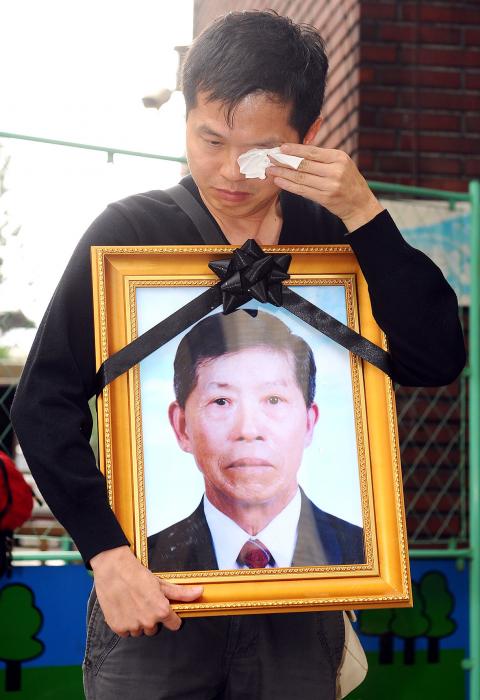The family of an elderly farmer who committed suicide last weekend by consuming herbicide to protest government expropriation of his land on Tuesday publicly denounced the Taoyuan Aerotropolis project and called for an end to forced expropriation of private land.
Lu A-yun (呂阿雲), 83, killed himself by drinking highly toxic herbicide on Saturday. His body was found by relatives when they came home after participating in a protest rally against forced land appropriation for the government-initiated NT$463 billion (US$15.8 billion) aerotropolis project.
The farmer owned property and farmland in Kuolin Village (菓林) in Taoyuan County’s Dayuan Township (大園), close to Taiwan Taoyuan International Airport, the nation’s most important air transport hub.

Photo: Chang Chia-ming, Taipei Times
Carrying a portrait of the deceased farmer, the family went to the Ministry of the Interior’s Construction and Planning Agency building in Taipei on Tuesday to express their grievance, saying that Lu’s death was the direct result of the government project.
“Our family’s property, farmland and our ancestors’ cemetery plots were all expropriated by the government. Our father committed suicide because he felt ashamed toward our ancestors for not being able to protect the family inheritance,” said one of Lu’s sons, Lu Wen-chung (呂文忠).
The core region of the Taoyuan Aerotropolis project covers an area of 6,859 hectares, of which 3,073 hectares needed to be expropriated from private land owners.
Under the project’s construction plan, 31 households in the area would have to make way for a 60m wide access road and a park.
Lu Wen-chung, a professor at the Taipei National University of the Arts, said the family were originally agreeable toward the government’s proposal to exchange the family’s agricultural land for land suitable for construction use.
“However, we never wanted to sell our family land,” he said. “Later we were surprised when the government’s new plan was tabled. In return, our family got our ancestors’ burial plots.”
Lu Wen-chung said his father felt that his whole life’s work had gone up in flames.
“He was distressed that his family had to move to the cemetery plots,” he said.
Wu Chi-ming (吳啟民), head of Taoyuan County’s Urban and Rural Development Bureau, said he regretted what had happened.
He admitted the project’s planning may have some oversights such as the delineation of cemetery plots into residential development zones.
“Future land allocation to original land owners will be done by drawing lots. The Taoyuan Government will also provide its opinions to the Ministry of the Interior to modify certain aspects of the aerotropolis project,” Wu said.
Additional reporting by Cheng Su-ting, staff reporter.

The manufacture of the remaining 28 M1A2T Abrams tanks Taiwan purchased from the US has recently been completed, and they are expected to be delivered within the next one to two months, a source said yesterday. The Ministry of National Defense is arranging cargo ships to transport the tanks to Taiwan as soon as possible, said the source, who is familiar with the matter. The estimated arrival time ranges from late this month to early next month, the source said. The 28 Abrams tanks make up the third and final batch of a total of 108 tanks, valued at about NT$40.5 billion

Travel agencies in Taiwan are working to secure alternative flights for travelers bound for New Zealand for the Lunar New Year holiday, as Air New Zealand workers are set to strike next week. The airline said that it has confirmed that the planned industrial action by its international wide-body cabin crew would go ahead on Thursday and Friday next week. While the Auckland-based carrier pledged to take reasonable measures to mitigate the impact of the workers’ strike, an Air New Zealand flight arriving at Taipei from Auckland on Thursday and another flight departing from Taipei for Auckland on Saturday would have to

A group from the Taiwanese Designers in Australia association yesterday represented Taiwan at the Midsumma Pride March in Melbourne. The march, held in the St. Kilda suburb, is the city’s largest LGBTQIA+ parade and the flagship event of the annual Midsumma Festival. It attracted more than 45,000 spectators who supported the 400 groups and 10,000 marchers that participated this year, the association said. Taiwanese Designers said they organized a team to march for Taiwan this year, joining politicians, government agencies, professionals and community organizations in showing support for LGBTQIA+ people and diverse communities. As the first country in Asia to legalize same-sex

MOTIVES QUESTIONED The PLA considers Xi’s policies toward Taiwan to be driven by personal considerations rather than military assessment, the Epoch Times reports Chinese President Xi Jinping’s (習近平) latest purge of the Chinese People’s Liberation Army (PLA) leadership might have been prompted by the military’s opposition to plans of invading Taiwan, the Epoch Times said. The Chinese military opposes waging war against Taiwan by a large consensus, putting it at odds with Xi’s vision, the Falun Gong-affiliated daily said in a report on Thursday, citing anonymous sources with insight into the PLA’s inner workings. The opposition is not the opinion of a few generals, but a widely shared view among the PLA cadre, the Epoch Times cited them as saying. “Chinese forces know full well that